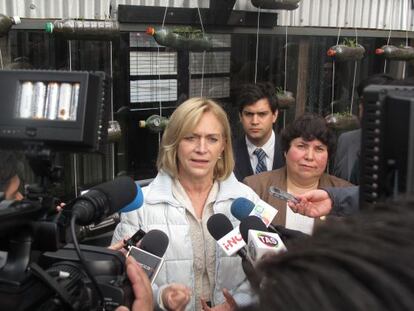Chile’s conservative coalition finds itself divided over presidential contender
Sudden resignation of candidate due to depression sparks internal discontent

The sudden resignation last week of a presidential candidate in Chile’s conservative coalition has caused deep rifts among the center-right groupings after a new contender was selected on Saturday.
National Renewal (RN) gave its coalition partner, Independent Democratic Union (UDI), until late Monday to come up with another contender after it nominated former Social Planning Minister Evelyn Matthei to replace Pablo Longueira, who bowed out of the race after announcing he was suffering from depression.
While the deadline approaches, it appears that both RN and UDI, which make up the ruling Alliance for Chile (APC), may end up choosing separate candidates to run against former President Michelle Bachelet in the November 17 elections.
“Sometimes I see that this alliance is more concerned about passing out trophies than thinking about the problems of this country,” said President Sebastián Piñera of his political coalition during a Chilean radio interview on Monday morning. “What we need today is unity, and to accomplish that we need strength.”
RN believes that Matthei, a 59-year-old engineer, is not capable of bringing the alliance together. “The situation inside the RN is difficult and complex; it is nothing personal but that’s the way it is,” said party secretary general Mario Desbordes.
“Sometimes I see that this alliance is more concerned about passing out trophies than thinking about the problems of this country,”
If no consensus with the UDI is reached, the most likely scenario would be to call a general council of the RN on August 10 to nominate former Defense Minister Andrés Allamand, who lost the June 30 primaries to Longueira.
However, there is some reluctance inside the UDI over whether Allamand, a former secretary of state, is strong enough to face Bachelet at the polls.
“One thing is a candidate of unity, about which no one has any complaints, but another thing is selecting a candidate whose possibilities of winning are very small,” said one UDI member.
During her first press conference after she was announced as the APC’s official contender, Matthei asked the two groups who make up the conservative alliance to work hard to defeat the leftist factions that are supporting Bachelet.
“I have always said that Michelle Bachelet is beatable and that is why I am asking the people of the Alliance to work really hard from this day on to make it happen,” said Matthei, a UDI member who has switched back and forth between that party and the RN.
Unlike Allamand, who earned the repudiation of his political partners for blaming the government for his defeat in the primaries in June, the UDI believes Matthei has cross-sector support. The party also agrees that the former minister also has a better chance to face off with Bachelet, who is favored in the polls to win.
Her willingness to give the former president a run for her money was evident when Matthei’s campaign manager, former minister Joaquín Lavín, said: “What we most want and what the sector wants – and Evelyn Matthei, of course wants – is that there be a candidate of unity.”
But the APC has had to cope with the most difficult series of setbacks in an election period since democracy was restored in 1990. On April 29, the UDI rejected the nomination of former Public Works Minister Laurence Golborne because of his poor showings in the polls. Later, Allamand set off internal tensions when he began blaming the government of President Piñera for his defeat in the June 30 primaries.
Then Longueira resigned his candidacy on Wednesday after announcing he was suffering from severe depression. Now the two parties that make up the alliance find themselves divided over Matthei.
Even though the situation is still unpredictable, there is a growing probability that the two parties may go to the November race with their own candidates. It won’t be the first time that this has occurred. In 2005, Piñera was backed by the RN while the UDI supported Lavín; both lost to Bachelet.
Tu suscripción se está usando en otro dispositivo
¿Quieres añadir otro usuario a tu suscripción?
Si continúas leyendo en este dispositivo, no se podrá leer en el otro.
FlechaTu suscripción se está usando en otro dispositivo y solo puedes acceder a EL PAÍS desde un dispositivo a la vez.
Si quieres compartir tu cuenta, cambia tu suscripción a la modalidad Premium, así podrás añadir otro usuario. Cada uno accederá con su propia cuenta de email, lo que os permitirá personalizar vuestra experiencia en EL PAÍS.
¿Tienes una suscripción de empresa? Accede aquí para contratar más cuentas.
En el caso de no saber quién está usando tu cuenta, te recomendamos cambiar tu contraseña aquí.
Si decides continuar compartiendo tu cuenta, este mensaje se mostrará en tu dispositivo y en el de la otra persona que está usando tu cuenta de forma indefinida, afectando a tu experiencia de lectura. Puedes consultar aquí los términos y condiciones de la suscripción digital.








































